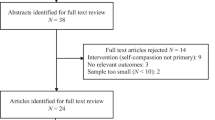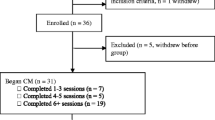Abstract
Objectives
This pilot study explores the impact of Mindful Self-Compassion (MSC) in veterans. Self-compassion, the capacity to hold one’s suffering with kindness and a wish to alleviate it, is associated with improvements in well-being. Veterans have more medical conditions than non-veterans and higher prevalence rates of severe pain. Acceptability of the intervention with veterans is assessed along with the impact of MSC on the physical, mental, and social health of the participants.
Methods
A racially diverse, predominantly male group of veterans (n = 80) were assessed pre- and post-MSC group with the Patient-Reported Outcomes Measurement Information System (PROMIS) to evaluate physical, mental, and social health. Measures of self-compassion, happiness, self-report medication usage, and a global assessment of improvement measure were also included. Qualitative responses to the MSC program were also solicited and reviewed.
Results
Engagement with MSC was high (74% completion rate) and 96% of treatment completers rated their participation in the intervention as positive. Completers demonstrated small to medium effect size increases in self-compassion, happiness, and social role satisfaction, 95% CIs (− 6.13, − 2.65), (− 2.62, − 1.06), and (− 4.28, − 1.05), and decreases in depression, anxiety, fatigue, and pain interference, 95% CIs (0.44, 4.13), (0.57, 4.84), (0.43, 3.71), and (0.13, 2.70). In exploratory analyses related to pain, veterans taking pain medication reported a significant decrease in use (χ2(2, N = 47) = 24.30, p < .001).
Conclusions
These results are suggestive of the positive effects of the MSC intervention to veterans, but await a randomized controlled trial to establish its effectiveness in this population.
Similar content being viewed by others
References
Amtmann, D., Cook, K. F., Jensen, M. P., Chen, W. H., Choi, S., Revicki, D., et al. (2010). Development of a PROMIS item bank to measure pain interference. Pain, 150(1), 173–182.
Cella, D., Riley, W., Stone, A., Rothrock, N., Reeve, B., Yount, S., et al. (2010). The Patient-Reported Outcomes Measurement Information System (PROMIS) developed and tested its first wave of adult self-reported health outcome item banks: 2005-2008. Journal of Clinical Epidemiology, 63(11), 1179–1194. https://doi.org/10.1016/j.jclinepi.2010.04.011.
Dahm, K. A., Meyer, E. C., Neff, K. D., Kimbrel, N. A., Gulliver, S. B., & Morissette, S. B. (2015). Mindfulness, self-compassion, posttraumatic stress disorder symptoms, and functional disability in US Iraq and Afghanistan war veterans. Journal of Traumatic Stress, 28(5), 460–464.
Eber, S., Barth, S., Kang, H., Mahan, C., Dursa, E., & Schneiderman, A. (2013). The National Health Study for a new generation of United States veterans: methods for a large-scale study on the health of recent veterans. Military Medicine, 178(9), 966–969.
Eibner, C., Krull, H., Brown, K. M., Cefalu, M., Mulcahy, A. W., Pollard, M., et al. (2016). Current and projected characteristics and unique health care needs of the patient population served by the Department of Veterans Affairs. Rand Health Quarterly, 5(4).
Espejo, E. P., Castriotta, N., Bessonov, D., Kawamura, M., Werdowatz, E. A., & Ayers, C. R. (2016). A pilot study of transdiagnostic group cognitive–behavioral therapy for anxiety in a veteran sample. Psychological Services, 13(2), 162.
Ferrari, M., Hunt, C., Harrysunker, A., Abbott, M. J., Beath, A. P., & Einstein, D. A. (2019). Self-compassion interventions and psychosocial outcomes: a meta-analysis of RCTs. Mindfulness, 10(8), 1455–1473.
Friis, A. M., Johnson, M. H., Cutfield, R. G., & Consedine, N. S. (2016). Kindness matters: a randomized controlled trial of a mindful self-compassion intervention improves depression, distress, and HbA1c among patients with diabetes. Diabetes Care, 39(11), 1963–1971.
Germer, C., & Barnhofer, T. (2017). Mindfulness and compassion. In P. Gilbert (Ed.), Compassion: Concepts, research and applications (pp. 69–86). Abingdon: Routledge.
Germer, C. K., & Neff, K. D. (2013). Self-compassion in clinical practice. Journal of Clinical Psychology, 69(8), 856–867.
Germer, C., & Neff, K. (2017). Mindful self-compassion teacher guide. San Diego: Center for Mindful Self-Compassion.
Germer, C., Neff, K., Becker, M., & Hickman, S. (2015). MSC Teacher Guide. San Diego: Center for Mindful Self-Compassion.
Goldberg, S. B., Zeliadt, S. B., Hoggatt, K. J., Simpson, T. L., Fortney, J. C., & Taylor, S. L. (2019). Utilization and perceived effectiveness of mindfulness meditation in veterans: results from a national survey. Mindfulness, 10(12), 2596–2605.
Held, P., & Owens, G. P. (2015). Effects of self-compassion workbook training on trauma-related guilt in a sample of homeless veterans: a pilot study. Journal of Clinical Psychology, 71(6), 513–526.
Hildebrandt, L. K., McCall, C., & Singer, T. (2017). Differential effects of attention-, compassion-, and socio-cognitively based mental practices on self-reports of mindfulness and compassion. Mindfulness, 8(6), 1488–1512.
IsHak, W. W., Pan, D., Steiner, A. J., Feldman, E., Mann, A., Mirocha, J., et al. (2017). Patient-reported outcomes of quality of life, functioning, and GI/psychiatric symptom severity in patients with inflammatory bowel disease (IBD). Inflammatory Bowel Disease, 23(5), 798–803. https://doi.org/10.1097/MIB.0000000000001060.
Kabat-Zinn, J. (2003). Mindfulness-based stress reduction (MBSR). Constructivism in the Human Sciences, 8(2), 73.
Katz, P., Pedro, S., & Michaud, K. (2016). Performance of the PROMIS 29-item profile in rheumatoid arthritis, osteoarthritis, fibromyalgia, and systemic lupus erythematosus. Arthritis Care Research, 69(9), 1312–1321. https://doi.org/10.1002/acr.23183.
Kearney, D. J., Malte, C. A., McManus, C., Martinez, M. E., Felleman, B., & Simpson, T. L. (2013). Loving-kindness meditation for posttraumatic stress disorder: a pilot study. Journal of Traumatic Stress, 26(4), 426–434.
Kemppainen, J. K., Brion, J. M., Leary, M., Wantland, D., Sullivan, K., Nokes, K., et al. (2013). Use of a brief version of the self-compassion inventory with an international sample of people with HIV/AIDS. AIDS Care, 25(12), 1513–1519. https://doi.org/10.1080/09540121.2013.780119.
Kirby, J. N., Tellegen, C. L., & Steindl, S. R. (2017). A meta-analysis of compassion-based interventions: current state of knowledge and future directions. Behavior Therapy, 48(6), 778–792.
Lang, A. J., Malaktaris, A. L., Casmar, P., Baca, S. A., Golshan, S., Harrison, T., & Negi, L. (2019). Compassion meditation for posttraumatic stress disorder in veterans: a randomized proof of concept study. Journal of Traumatic Stress, 32(2), 299–309.
LeBeau, R., Izquierdo, C., Culver, N., Karahalios, D., & Serpa, J. G. (2018). A pilot study examining the effect of integrative tinnitus management (ITM) on tinnitus distress and depression symptoms in veterans. Psychological Services, 17(2), 227–232.
Lyubomirsky, S., & Lepper, H. S. (1999). A measure of subjective happiness: preliminary reliability and construct validation. Social Indicators Research, 46(2), 137–155. https://doi.org/10.1023/A:1006824100041.
MacBeth, A., & Gumley, A. (2012). Exploring compassion: a meta-analysis of the association between self-compassion and psychopathology. Clinical Psychology Review, 32(6), 545–552.
Nahin, R. L. (2017). Severe pain in veterans: the effect of age and sex, and comparisons with the general population. The Journal of Pain, 18(3), 247–254.
National Research Council. (2010). The prevention and treatment of missing data in clinical trials. Panel on Handling Missing Data in Clinical Trials. Committee on National Statistics, Division of Behavioral and Social Sciences and Education. Washington, DC: The National Academic Press.
Neff, K. (2003). Self-compassion: an alternative conceptualization of a healthy attitude toward oneself. Self and Identity, 2(2), 85–101. https://doi.org/10.1080/15298860309032.
Neff, K. (2016). The Self-Compassion Scale is a valid and theoretically coherent measure of self-compassion. Mindfulness, 7(1), 264–274.
Neff, K. D., & Germer, C. K. (2013). A pilot study and randomized controlled trial of the mindful self-compassion program. Journal of Clinical Psychology, 69(1), 28–44.
Neff, K., Whittaker, T. A., & Karl, A. (2017). Examining the factor structure of the self-compassion scale in four distinct populations: is the use of a total scale score justified? Journal of Personality Assessessment, 99(6), 596–607. https://doi.org/10.1080/00223891.2016.1269334.
Pleil, A. M., Coyne, K. S., Reese, P. R., Jumadilova, Z., Rovner, E. S., & Kelleher, C. J. (2005). The validation of patient-rated global assessments of treatment benefit, satisfaction, and willingness to continue—the BSW. Value in Health, 8, S25–S34.
Raes, F., Pommier, E., Neff, K. D., & Van Gucht, D. (2011). Construction and factorial validation of a short form of the Self-Compassion Scale. Clinical Psychology & Psychotherapy, 18(3), 250–255. https://doi.org/10.1002/cpp.702.
Rose, A. J., Bayliss, E., Huang, W., Baseman, L., Butcher, E., García, R.-E., & Edelen, M. O. (2018). Evaluating the PROMIS-29 v2.0 for use among older adults with multiple chronic conditions. Quality of Life Research, 27(11), 2935–2944. https://doi.org/10.1007/s1136-018-1958-5.
Rubin, D. B. (1987). Multiple imputation for nonresponse in surveys. New York: Wiley.
Schnall, R., Liu, L., Cho, H., Hirshfield, S., Siegel, K., & Olender, S. (2017). A health-related quality-of-life measure for use in patients with HIV: a validation study. AIDS Patient Care and STDs, 31(2), 43–48. https://doi.org/10.1089/apc.2016.0252.
Schnitzer, T. J., Easton, R., Pang, S., Levinson, D. J., Pixton, G., Viktrup, L., ... & Verburg, K. M. (2019). Effect of tanezumab on joint pain, physical function, and patient global assessment of osteoarthritis among patients with osteoarthritis of the hip or knee: a randomized clinical trial. Journal of the American Medical Association, 322(1), 37–48.
Seal, K. H., Metzler, T. J., Gima, K. S., Bertenthal, D., Maguen, S., & Marmar, C. R. (2009). Trends and risk factors for mental health diagnoses among Iraq and Afghanistan veterans using Department of Veterans Affairs health care, 2002–2008. American Journal of Public Health, 99(9), 1651–1658.
Serpa, J. G., Taylor, S. L., & Tillisch, K. (2014). Mindfulness-based stress reduction (MBSR) reduces anxiety, depression, and suicidal ideation in veterans. Medical Care, 52, S19–S24.
Shi, Q., Mendoza, T. R., & Cleeland, C. S. (2019). Interpreting patient-reported outcome scores for clinical research and practice: definition, determination, and application of cutpoints. Medical Care, 57, S8–S12.
Acknowledgements
We also acknowledge our co-facilitators of MSC including Deniz Ahmadinia, PsyD, Jesse Barglow, PhD, LaTonia Chalmers, MHNP-BC, Taryn Gammon, PhD, Christine Izquierdo, PsyD, Erin Margolis, PhD, Paul Perales, PsyD, Caroline Prouvost, PhD, Wendy Schmelzer, LCSW, Christiane Wolf, MD, and Jon Yahalom, PhD.
Funding
The VA Office of Patient-Centered Care and Cultural Transformation provided funding for MSC teacher training and for supporting this work including Tracy Gaudet, MD; Ben Kligler, MD; and locally Sandy Robertson, RN, MSN.
Author information
Authors and Affiliations
Contributions
JGS designed and executed the study, delivered most cycles of the intervention, collaborated in the analyses, and was the primary author. CPB delivered several cycles of the intervention, collaborated in analyses, and collaborated in writing the manuscript. GNA managed the data set, co-delivered one cycle of the intervention, and collaborated on edits to the manuscript. JMP delivered several cycles of the intervention, conducted the data analysis, and contributed to writing the manuscript.
Corresponding author
Ethics declarations
Conflict of Interest
The authors declare that they have no conflicts of interest.
Ethical Approval
The study was approved by the IRB of Greater Los Angeles Healthcare System. As an approved quality improvement study, informed consent was waived. All procedures performed in studies involving human participants were in accordance with the ethical standards of the IRB and with the 1964 Helsinki Declaration and its later amendments or comparable ethical standards.
Additional information
Publisher’s Note
Springer Nature remains neutral with regard to jurisdictional claims in published maps and institutional affiliations.
Rights and permissions
About this article
Cite this article
Serpa, J.G., Bourey, C.P., Adjaoute, G.N. et al. Mindful Self-Compassion (MSC) with Veterans: a Program Evaluation. Mindfulness 12, 153–161 (2021). https://doi.org/10.1007/s12671-020-01508-1
Accepted:
Published:
Issue Date:
DOI: https://doi.org/10.1007/s12671-020-01508-1




